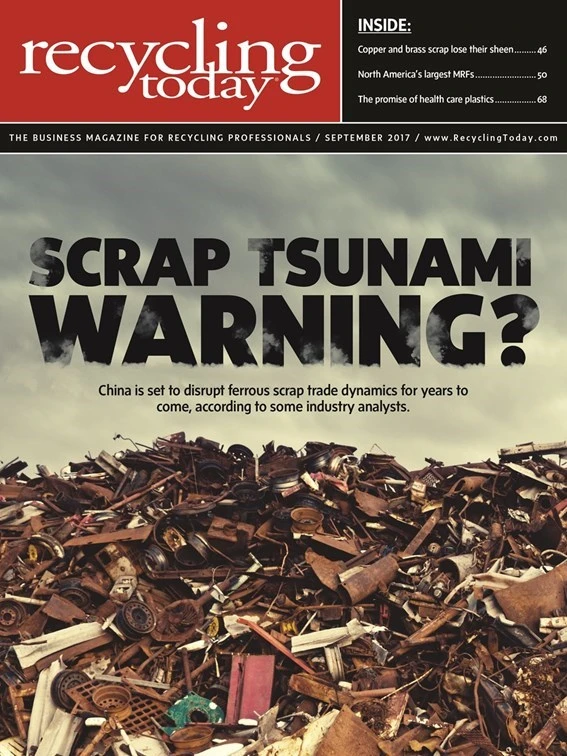
China’s move in mid-July to notify the World Trade Organization (WTO) of its intent to ban certain scrap imports, including a year-end ban on mixed paper, already has brought about changes, from export demand to pricing.
The notification to the WTO Committee on Technical Barriers to Trade states that shipments with bills of lading dated prior to Sept. 1, 2017, will be accepted at ports only until Dec. 31, 2017 (subject to an official announcement).
Sources point to this proposed ban as a core factor in the drop in per-ton pricing for nearly all recovered paper grades sold off the U.S. West Coast. Boston-based research firm RISI’s Aug. 4 PPW Yellow Sheet shows the per-ton FAS (free alongside ship, meaning the seller must deliver goods to a named port alongside a vessel the buyer designates) prices to China from the Los Angeles and San Francisco/Oakland ports decreased by $16 and $17 for mixed paper, respectively; by $14 and $18 for old corrugated containers (OCC); and by $13 and $14 for sorted residential papers and news (SRPN). While sorted office paper (SOP) declined $4 per ton FAS to China, the high grade increased its per-ton FAS price by $5 out of the Los Angeles port.
Domestic pricing for the major secondary fiber grades in August remained flat throughout much of the U.S. OCC and SRPN pricing hiked in the Southwest, while pricing for both of those grades and for mixed paper dropped on the West Coast, including in the Pacific Northwest.
“California is live or die by export … that’s why you’re seeing dramatic drops in pricing in California compared to the East Coast,” says a source based in the Pacific Northwest.

He adds that China’s proposed ban on scrap imports could force municipalities as well as recycling and waste diversion businesses to invest more in people and systems to better sort and clean recovered fiber streams. “China has put the fear of God in everybody because if they don’t take the normal mix that is coming out right now, that’s going to be a huge issue because who’s going to take it?” he asks.
A trader based in the Midwest says, with a $114-per-ton price difference between OCC and mixed paper, it would make financial sense to add another sorter to the fiber line.
In addition, U.S. mills have been stocking up on mixed paper, he says.
“In the Southwest and Southeast, I’ve been getting calls for mixed paper because mills want to try to fill up with mixed paper as much as they can before they can’t buy it anymore,” says the Midwest-based broker.
Ranjit Baxi, president of the Brussels-based Bureau of International Recycling (BIR), reports in the organization’s July “BIR World Mirror on Recovered Paper” that China’s decisions certainly have affected export markets. He writes that exporters have made a more aggressive effort to pursue new markets “for the purposes of diversification.”

Baxi writes, “Clearer indications from the Chinese authorities about their import policies would help to stabilize the market.”
Another source of headaches: China’s slow response to reissuing import permits. The West Coast-based source says that while mills in that country are trying to renew permits to import more recovered fiber, they haven’t received the necessary approvals.
He says it is currently a buyer’s market as countries without China’s permitting issue “are taking advantage of this.”
The West Coast-based source continues, “Mills want and need the material, but they don’t have the permits, and it’s thrown a wrench into the works, and, as a result, people can’t move volumes. I think there’s going to be so much pent-up demand that prices will shoot up again.
“In the meantime,” he adds, U.S.-based suppliers of recovered fiber “have stuff coming out of their ears [and are] saying, ‘Where am I going to take this stuff?’”
Fortunately, demand for recovered fiber grades remains strong in the domestic market, sources say.

Explore the September 2017 Issue
Check out more from this issue and find your next story to read.
Latest from Recycling Today
- ShearCore adds dealership group in Canada
- Hitachi forms new executive team for the Americas
- Southwire joins Vinyl Sustainability Council
- Panasonic, Sumitimo cooperate on battery materials recycling in Japan
- Open End Auto Tie Balers in stock, ready to ship
- Reconomy names new chief financial officer
- ICIS says rPET incentives remain weak
- New Jersey officials award $16.2M in annual recycling, waste reduction grants





